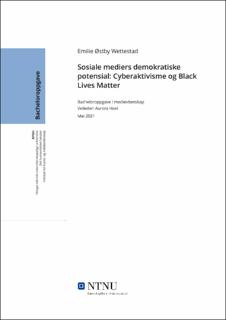Sosiale mediers demokratiske potensial: Cyberaktivisme og Black Lives Matter
Bachelor thesis
Permanent lenke
https://hdl.handle.net/11250/2776655Utgivelsesdato
2021Metadata
Vis full innførselSamlinger
Sammendrag
Denne oppgaven tar utgangspunkt i å undersøke hvordan mediene tilrettelegger for deltagelse i demokratiet, mer spesifikt for hvordan sosiale medier tilrettelegger for sosial aktivisme. For å undersøke dette har jeg valgt å fokusere på cyberaktivisme med Black Lives Matter-bevegelsen fra 2020 som eksempel. Oppgaven inneholder en redegjørelse av de etablerte mediene og deres utfordring med det digitale skiftet og utviklingen av sosiale medier. Videre diskuterer oppgaven teorier knyttet til hvordan mediene tilrettelegger for ulike former for aktivisme, med særlig fokus tilknyttet ulike teorier om sosial aktivisme, deriblant cyberaktivisme, ikke-aktivisme og slacktivisme. Videre er en redegjørelse for Black Lives Matter-bevegelsen, som er viktig for å forstå George Floyd-saken fra 2020. Oppgaven vil beskrive hva Black Lives Matter-bevegelsen er, hva den betyr i symbolsk og samfunnsmessig sammenheng og hvordan Black Lives Matter organiseres som fysisk og digitalt fellesskap.
Trådene samles i en casestudie av Black Lives Matter-bevegelsen, slik denne utfoldet seg i sosiale medier i forbindelse med og som en reaksjon på drapet av George Floyd. Gjennom denne casestudien forsøker jeg å si noe om sosiale mediers rolle som tilretteleggere for sosial aktivisme. Avslutningsvis diskuteres det hvordan Floyd-saken og Black Lives Matter-bevegelsen demonstrerer medienes demokratiske potensial i samfunnet, og i den forbindelse hvorfor bevegelsen engasjerer så mange. This thesis examines how the media facilitates participation in democracy, more specifically for how social media facilitates social activism. To investigate this, I have chosen to focus on cyber activism with the Black Lives Matter movement from 2020 as an example. The thesis contains an account of the established media and their challenge with the digital shift and the development of social media. Furthermore, the thesis discusses theories related to how the media facilitate various forms of activism, with particular focus on various theories of social activism, including cyberactivism, non-activism and slacktivism. Furthermore, there is an account of the Black Lives Matter movement, which is important for understanding the George Floyd case from 2020. The thesis will describe what the Black Lives Matter movement is, what it means in a symbolic and social context and how Black Lives Matter is organized as physical and digital community. The threads are gathered in a case study of the Black Lives Matter movement, as it unfolded on social media in connection with and as a reaction to the murder of George Floyd. Through this case study, I try to say something about the role of social media as facilitators of social activism. Finally, it is discussed how the Floyd case and the Black Lives Matter movement demonstrate the media's democratic potential in society, and in this connection why the movement engages so many.
